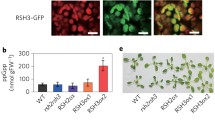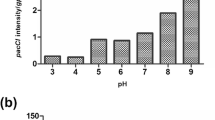Abstract
Polyphosphate levels are modulated by the actions of polyphosphate kinase, encoded by ppk, and exopolyphosphatase, encoded by ppx. The genes ppk and ppx are adjacent to each other in the genome of the root colonizer, Pseudomonas chlororaphis O6. A ppk-deficient mutant was more sensitive to oxidative stress than the wild-type and the ppx mutant. Transcripts from ppx increased as cultures matured from mid- to late-logarithmic and stationary phases, whereas abundance was greater for ppk in the late-logarithmic phase than in the stationary phase. Transcript accumulation from the rpoS gene, encoding the stationary-phase sigma factor RpoS, was decreased in the mid- and late-logarithmic and stationary phases in the ppk mutant. Thus, ppk regulates rpoS transcript accumulation in P. chlororaphis O6. However, mutations in either the ppk or ppx genes had no effect on induction of systemic resistance in plants colonized by P. chlororaphis O6.



Similar content being viewed by others
Literature Cited
Akiyama M, Crooke E, Kornberg A (1993) An exopolyphosphatase of Escherichia coli. J Biol Chem 268:633–639
Ault-Riché D, Fraley CD, Tzeng C-M, Kornberg A (1998) Novel assay reveals multiple pathways regulating stress-induced accumulations of inorganic polyphosphate in Escherichia coli. J Bacteriol 180:1841–1847
Bertani I, Sevo M, Kojic M, Venturi V (2003) Role of GacA, LasI, RhlI, Ppk, PsrA, Vfr, and ClpXP in the regulation of the stationary-phase sigma factor rpoS/RpoS in Pseudomonas. Arch Microbiol 180:264–271
Elhai J, Wolk CP (1988) A versatile class of positive-selection vectors based on the nonviability of palindrome-containing plasmids that allows cloning into long polylinkers. Gene 68:119–138
Hirsch M, Elliott T (2002) Role of ppGpp in rpoS stationary-phase regulation in Escherichia coli. J Bacteriol 184:5077–5087
Kang BR, Cho BH, Anderson AJ, Kim YC (2004) The global regulator GacS of a biocontrol bacterium Pseudomonas chlororaphis O6 regulates transcription from the rpoS gene encoding a stationary-phase sigma factor and affects survival in oxidative stress. Gene 325:137–143
Kim K-S, Rao NN, Fraley CD, Kornberg A (2002) Inorganic polyphosphate is essential for long-term survival and virulence factors in Shigella and Salmonella spp. Proc Natl Acad Sci USA 99:7675–7680
Kim MS, Kim YC, Cho BH (2004) Gene expression analysis in cucumber leaves primed by root colonization with Pseudomonas chlororaphis O6 on challenge-inoculation with Corynespora cassiicola. Plant Biol 6:105–108
Kim YC, Kim CS, Cho BH, Anderson AJ (2004) Major Fe-superoxide dismutase (FeSOD) activity in Pseudomonas putida is essential for survival under conditions of oxidative stress during microbial challenge and nutrient limitation. J Microbiol Biotechnol 14:859–862
Kornberg A, Rao NN, Ault-Riche D (1999) Inorganic polyphosphate: A molecule of many functions. Annu Rev Biochem 68:89–125
Miller CD, Kim YC, Anderson AJ (1997) A method to derive a promoter fusion and activate the gene for the stationary-phase inducible catalase (catC) from Pseudomonas putida. J Bacteriol 179:5241–5245
Nam HS, Anderson AJ, Yang KY, Kim YC (2006) The dctA gene of Pseudomonas chlororaphis is under RpoN control and is required for effective root colonization and induction of systemic resistance. FEMS Microbiol Lett 256:98–104
Rashid MH, Rumbaugh K, Passador L, Davies DG, Hamood AN, Iglewski BH, et al. (2000) Polyphosphate kinase is essential for biofilm development, quorum sensing, and virulence of Pseudomonas aeruginosa. Proc Natl Acad Sci USA 97:9636–9641
Sambrook J, Frithsch EF, Maniatis T (1989) Molecular cloning: A laboratory manual, 2nd ed. Cold Spring Harbor, NY: Cold Spring Harbor Laboratory Press
Sarniguet A, Kraus J, Henkels MD, Muehlchen AM, Loper JE (1995) The sigma factor σs affects antibiotic production and biologic control activity of Pseudomonas fluorescens Pf-5. Proc Natl Acad Sci USA 94:12255–12259
Shiba T, Tsutsumi K, Yano H, Ihara Y, Kameda A, Tanaka K, et al. (1997) Inorganic polyphosphate and the induction of rpoS expression. Proc Natl Acad Sci USA 94:11210–11215
Spencer M, Ryu CM, Yang KY, Kim YC, Kloepper JW, Anderson AJ (2003) Induced defenses in tobacco by Pseudomonas chlororaphis O6 involves the ethylene pathway. Physiol Mol Plant Pathol 67:27–34
Timmusk S, Grantcharova N, Wagner EG (2005) Paenibacillus polymyxa invades plant roots and forms biofilms. Appl Environ Microbiol 71:7293–7300
Timmusk S, Wagner EG (1999) The plant-growth-promoting rhizobacterium Paenibacillus polymyxa induces changes in Arabidopsis thaliana gene expression: A possible connection between biotic and abiotic stress responses. Mol Plant Microbe Interact 12:951–959
Venturi V (2003) Control of rpoS transcription in Escherichia coli and Pseudomonas: Why so different? Mol Microbiol 49:1–9
Walker TS, Bais HP, Deziel E, Schweizer HP, Rahme LG, Decrease R, Vivanco JM (2004) Pseudomonas aeruginosa-plant root interactions. Pathogenicity, biofilm formation, and root exudation. Plant Physiol 134:320–331
Whistler CA, Corbell NA, Sarniguet A, Ream W, Loper JE (1998) The two-component regulators GacS and GacA influence accumulation of the stationary-phase sigma σs and the stress response in Pseudomonas fluorescens Pf-5. J Bacteriol 180:6635–6641
Zdor R, Anderson AJ (1992) Influence of root colonizing pseudomonads on defense mechanisms of bean. Plant Soil 140:99–107
Zhang H, Ishige K, Kornberg A (2002) A polyphosphate kinase (PPK2) widely conserved in bacteria. Proc Natl Acad Sci USA 99:16678–16683
Acknowledgments
This work was supported by a grant (Code No. 20050401034716) from the BioGreen 21 program, Rural Development Administration, Republic of Korea, and by a grant from the Technology Development Program for Agriculture and Forestry, Ministry of Agriculture and Forestry, Republic of Korea. This work was also supported by a grant from the Utah Agricultural Experiment Station to A. J. A.
Author information
Authors and Affiliations
Corresponding author
Rights and permissions
About this article
Cite this article
Kim, H., Yang, K.Y., Cho, B.H. et al. Transcript Accumulation from the rpoS Gene Encoding a Stationary-Phase Sigma Factor in Pseudomonas chlororaphis Strain O6 Is Regulated by the Polyphosphate Kinase Gene. Curr Microbiol 54, 219–223 (2007). https://doi.org/10.1007/s00284-006-0361-6
Received:
Accepted:
Published:
Issue Date:
DOI: https://doi.org/10.1007/s00284-006-0361-6




